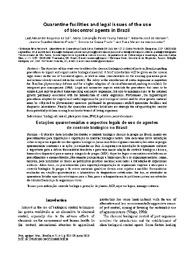Quarantine facilities and legal issues of the use of biocontrol agents in Brazil.
Quarantine facilities and legal issues of the use of biocontrol agents in Brazil.
Author(s): SA, L. A. N. de; PESSOA, M. C. P. Y.; MORAES, G. J. de; PRADO, J. S. M.; PRADO, S. de S.; VASCONCELOS, R. M. de
Summary: The objective of this work was to address the classical biological control of pests in Brazil, regarding procedures to import and export native biological material. A brief introduction will be given on the current legal issues on the use of biocontrol agents, as well as some considerations on the existing quarantine pests and actions already carried out in the country. The safety in the introduction of exotic organisms is important for Brazilian phytosanitary defense and for a higher adoption of classical biocontrol, making it available for integrated pest management (IPM). Legal and normative aspects establish the procedures that must to be adopted, not only to protect bioprospecting and native organisms, but also to minimize risks to the national genetic patrimony associated with the introduction of exotic organisms. Furthermore, the import/export procedures adopted for vegetal and useful organisms for pest biological control and for other genetic material must be subjected to phytosanitary measures performed in government?certified quarantine facilities and diagnostic laboratories. Finally, the quarantine activities listed here are strategic for safeguarding the country from potential problems arising from border transit of living organisms.
Publication year: 2016
Types of publication: Journal article
Observation
Some of Embrapa's publications are published as ePub files. To read them, use or download one of the following free software options to your computer or mobile device. Android: Google Play Books; IOS: iBooks; Windows and Linux: Calibre.
Access other publications
Access the Agricultural Research Database (BDPA) to consult Embrapa's full library collection and records.
Visit Embrapa Bookstore to purchase books and other publications sold by Embrapa.

